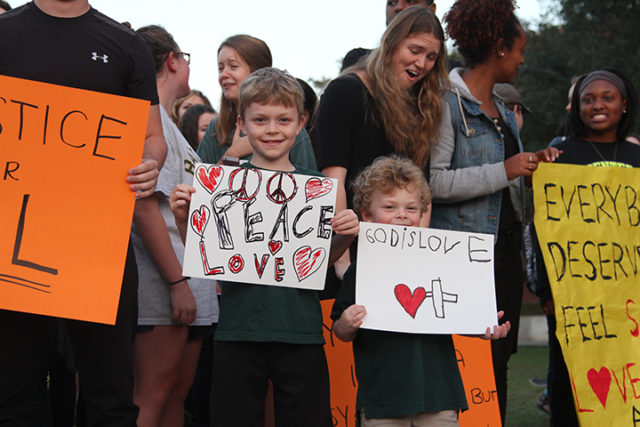By Isabella Maso | Reporter
Dr. Ryan Richardson, associate chaplain and director of worship and chapel, has been at Baylor for 15 years. He has seen the transition of three U.S. presidents in his time at the university, but there has never been an election quite like the 2016 presidential election.
Since the final results of the election were announced, what are the most common sentiments, positive or negative, that you’ve heard from Baylor students?
Because of my role, I typically hear from students who are in pain, so by nature of my role, I end up talking to students who are struggling in moments of distress. And so the sentiment I have gathered from students tends to flow more along the lines of frustration and fear. That being said, I’m fully aware that there are students who are excited and hopeful on both sides.
What are the main concerns students have voiced to you?
I’ve had students come to me who have expressed fear concerning immigration. I have had students come to me to tell me that their parents are worried about their own status, whether they can stay in the United States or not. I have also had students come to me afraid that sexual assault or the degrading of women has been romanticized or placed on a pedestal.
What are your thoughts about #IWalkWithNatasha?
The most important thing about that, in my opinion, is that students saw injustice and they said, ‘We are not OK with that.’ I was so impressed and amazed, but it did make me wonder: If we were to have said to students, ‘Hey, there have been people that have been sexually assaulted on this campus over the last many years, what are you going to do about it?’ Rather than leaving it in the programmatic arena, after seeing the walk last week, it made me think, ‘I wonder if our students would’ve done a better job of responding and saying, ‘This is not OK.’ Because I can guarantee you that every student who was out there on that walk would’ve done the same thing if we were to ask to give that show of confidence in our community’s ability to protect one another, show the nation that we are going to protect one another in this community. I believe our students would show up and rise up to say that none of this is OK.

What role do you think Baylor Spiritual Life plays in this situation?
I’m hoping that we can be a more supportive voice for students who are deciding to let their voice be heard. Because injustice is not OK no matter what side it’s on. Obviously we are always there for students to try to heal. Most importantly, however, I think that our role is to help point students and their opinions to Scripture to either confirm or disaffirm whatever it is they are feeling and wanting to be heard about. Utilize Scripture to help back them up or point them in a different direction, because no matter what your opinion is about in any topic, we have to look to Scripture to help us interpret.
Tensions are high between opposing political supporters on campus. What do you think would help ease things a little?
To quell the social anxiety at Baylor, I think we have to call on one another back to a Gospel narrative. The Gospel narrative has come into contact with the social narrative, whether it be about racial reconciliation or the social narrative about sexual assault and the dangers of that. Those have become political issues, but they have always been Gospel issues. If we can pull ourselves back and say, ‘We still have to heal as a campus,’ maybe wave a flag and say, ‘The election is over’ and recognize that we still have some of our own issues.
Is there anything you think students should really focus on during this time?
Reconciling ourselves to God so that we might reconcile ourselves to one another regardless of race or ethnicity. I think race and ethnicity has still been a dividing point for our campus community. I think if we could focus on those things, praying to God that we might reconcile ourselves to God, I think it would be great to take our minds off of other things.
Do you feel that events like protests, as there were on Fountain Mall last week, allow students to healthfully spark conversation about their concerns with the election? Or do you think there are better ways to voice concerns?
I think that was a great way to do it. I mean, my kids were out there. The reason I think that’s a great way to do it is because they can be heard. Students need to be able to say what they want to say, and it has to be in venues that aren’t just Facebook. As a matter of fact, I think it’s probably a healthier situation because they are face to face with people. When you’re behind a screen, it gives you a bit more freedom than is necessarily healthy or helpful.



